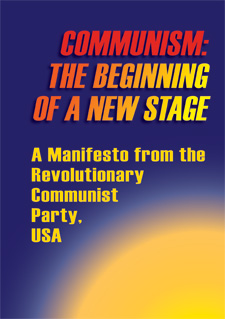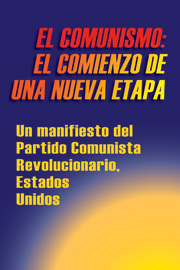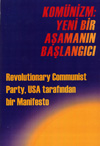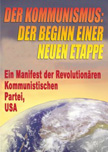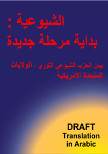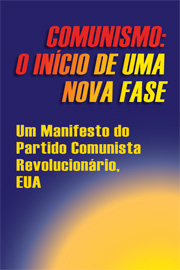Check It Out: The Square
November 4, 2013 | Revolution Newspaper | revcom.us
The documentary film The Square, by the filmmaker Jehane Noujaim, brings us inside the mass uprisings in Egypt—the courageous outpourings that toppled the decades-long, brutal U.S.-backed regime of Hosni Mubarak in the winter of 2011. And it takes us up to current events in that country, through the complex struggle of the Egyptian people in the tumultuous two years since the fall of Mubarak.
The film takes its name from Tahrir Square—the square in the middle of Egypt’s capital city, Cairo—where protests, counterprotests, violent repression, and mass debates have been concentrated since the uprising began.
The struggle against Mubarak, and the search for a way to continue to fight for freedom, is presented through the eyes of three protagonists. Ahmed Hassan is a rebellious and free-spirited working class youth. The camera is behind and beside him as he and other rebellious forces (mainly youth) go literally up in the face of the arguments, the threats, and the violence of defenders of both the army that serves and enforces the rule of the entrenched pro-U.S. Egyptian ruling class and the reactionary “alternative” forces of the Muslim Brotherhood. Khalid Abdalla is an actor and activist who has appeared in movies like The Kite Runner. He struggles to make the world aware of the brutal repression against the people which, as he calls out in The Square, is funded by the U.S. The third activist is Magdy Ashour—torn between his membership in the Muslim Brotherhood and his repulsion at some of the ways in which the Brotherhood betrays the interests of the people. The last we learn of Magdy Ashour is that he has been rounded up by the army in the bloody aftermath of the military coup that ended the elected presidency of the Muslim Brotherhood’s Mohamed Morsi in 2013.
There are many reasons to see The Square. It is a powerful, visceral slice of reality that gives a feel for what it is like when people in their millions awaken to political life and are searching for a way to get free. Even for those of us who have been following the struggle in Egypt through articles at revcom.us and beyond, this is as close as most of us will get to the mass debates, the tear gas and bullets, the anguished arguing and wrangling over how to move the struggle forward among the activists, and the cold-blooded logic, immorality, and reactionary violence of the defenders of the old order (who express themselves quite freely in interviews in the film).
 The Constitution for the New Socialist Republic in North America (Draft Proposal) from the RCP is written with the future in mind. It is intended to set forth a basic model, and fundamental principles and guidelines, for the nature and functioning of a vastly different society and government than now exists: the New Socialist Republic in North America, a socialist state which would embody, institutionalize and promote radically different relations and values among people; a socialist state whose final and fundamental aim would be to achieve, together with the revolutionary struggle throughout the world, the emancipation of humanity as a whole and the opening of a whole new epoch in human history–communism–with the final abolition of all exploitative and oppressive relations among human beings and the destructive antagonistic conflicts to which these relations give rise.
The Constitution for the New Socialist Republic in North America (Draft Proposal) from the RCP is written with the future in mind. It is intended to set forth a basic model, and fundamental principles and guidelines, for the nature and functioning of a vastly different society and government than now exists: the New Socialist Republic in North America, a socialist state which would embody, institutionalize and promote radically different relations and values among people; a socialist state whose final and fundamental aim would be to achieve, together with the revolutionary struggle throughout the world, the emancipation of humanity as a whole and the opening of a whole new epoch in human history–communism–with the final abolition of all exploitative and oppressive relations among human beings and the destructive antagonistic conflicts to which these relations give rise.
Read the entire Constitution for the New Socialist Republic in North America (Draft Proposal) from the RCP at revcom.us/rcp.
For readers of revcom.us, theatrical showings of the film in your area are a chance to connect the analysis of Egypt in articles at revcom.us with an audience that is likely to leave the film discussing and arguing over how to understand what is happening in Egypt and the lessons for people seeking liberation. At the showing I attended, that discussion included thoughtful and passionate exchanges around the role of women in the struggle in Egypt, and the lack of focus on their role in the film (the filmmaker, Jehane Noujaim, is a woman, and there are women interviewed in the documentary—particularly Aida El Kashef—but for whatever reason she and other women activists aren’t given the same stage as the three main male subjects). And showings are a chance to bring Bob Avakian’s new synthesis of communism to an audience confronting the question: what is revolution.
But there are other reasons why followers of revcom.us in particular should see this movie. We get a vivid picture of what a potential revolutionary situation feels like, from the point of view of forces who, with their limitations, are trying to break through and bring forward something far more radical than the “choices” offered by the dominant paradigm. If you lived through the 1960s in somewhere like the U.S. or France, your memories of that era will be revived. If you haven’t lived through such a historic moment, all the more reason to check out this film.
In his review of the film in the New York Times, A.O. Scott notes, “Ms. Noujaim’s sympathies are clearly with those who refer to themselves as ‘revolutionaries’—a word that comes to signify resistance to both the Brotherhood and the military—but she is hardly blind to their limitations.” And Scott comments, with some insight, that “The revolutionaries are able to compel the world’s attention and sympathy, and to risk life and limb in defiance of authority, but they have neither the organizational discipline nor the strategic ability to assume and exercise power. Lacking weapons or a party apparatus, they become pawns and bystanders in an increasingly lethal struggle between forces more ruthless and less principled than they.”
For those who are working to grasp and apply the RCP’s “On the Strategy for Revolution,” who are struggling to work backwards from the future revolutionary situation that we are both working to hasten, and prepare for, you can get a powerful sense of how essential it is to enter into such a situation with a revolutionary communist vanguard party, with the requisite “organizational discipline,” and with “strategic ability” to lead people, and transform them, on a tumultuous and rapidly shifting political landscape, to “assume and exercise power.” And you can appreciate in a very visceral way how essential it is to have a critical mass cohered in a revolutionary movement around the core—hundreds now who can quickly expand to be thousands, and then lead millions with a vision, strategy, and a Constitution for a new society aimed at doing away with all oppression.
COMMUNISM: THE BEGINNING OF A NEW STAGE
A Manifesto from the Revolutionary Communist Party, USA
Available in English, Farsi, German, Portuguese, Spanish and Turkish from RCP Publications, P.O. Box 3486, Merchandise Mart, Chicago, IL 60654
$5 + $1 shipping. A draft translation into Arabic is now available online. See all translations here.
If you like this article, subscribe, donate to and sustain Revolution newspaper.

